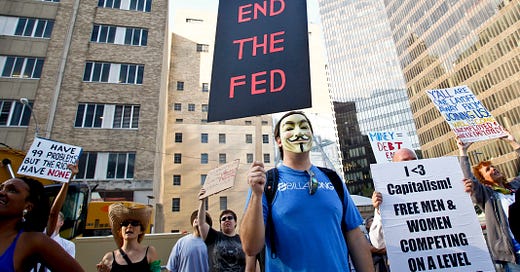The Origins and Fate of the Neoliberal Order
How I present contemporary political theory to my students

In my course on contemporary political theory this semester, we began with Postwar Liberalism (Isaiah Berlin, Lionel Trilling, Reinhold Niebuhr, and Hannah Arendt). Then we moved on to the New Left (Antonio Gramsci, Frantz Fanon, and Herbert Marcuse). Our final unit prior the midterm exam was on Post-’60s Liberalism, which was really just an introduction to John Rawls.
After the midterm, we spent a couple of weeks on the New Right—first on libertarianism (Friedrich Hayek, Milton Friedman, and Robert Nozick), then on neoconservatism (Leo Strauss and Irving Kristol)—before turning to the unit we completed last week: The Neoliberal Moment, which focused on Francis Fukuyama and Cass Sunstein.
I think this last unit went quite well and has nicely pointed the way forward to the final two units in the course: The New New Left and Right-Populist Reaction. I thought my readers here might appreciate getting a sense of how I set up this story for my students, since I consider it a pretty illuminating account of how we got to our present moment of waning neoliberalism.
The Meaning of the Neoliberal Moment
Longtime readers know how much I admire Francis Fukuyama’s The End of History and the Last Man (1992). For those unfamiliar with the book (as opposed to caricatures of it that you’re likely to hear from those who dismiss it too easily), Fukuyama suggested that the fall of the Berlin Wall and triumph of liberal democracy in the Cold War may well mark the termination of world history, understood as “a single, coherent, evolutionary process, when taking into account the experience of all peoples in all times.”
The End of History
In Fukuyama’s view, this evolutionary process is driven forward by what he calls (following G.W.F. Hegel and his great 20th-century interpreter Alexandre Kojève) the “desire for recognition.” Each social system in history proposes to satisfy this desire in one way or another. But eventually contradictions emerge in each system—tensions among its governing ideals and between its ideals and its lived reality—that lead to a crisis that culminates in a civil war or revolution. From out of that crisis, a new order emerges that seeks to satisfy the desire for recognition in another, better way—at least until that new order reaches a crisis of its own and the evolutionary process continues onward, down through the centuries and millennia.
Fukuyama’s core claim is that once tribalistic forms of right-wing politics (fascism, Nazism, Japanese imperialism) were defeated in World War II, just two alternatives remained: liberal democracy and communism, with the nations of the world lining up on one side or another of this fundamental divide and the ultimate outcome of the decades-long contest unknown.
But with the events of 1989, the contest was decided. Communism collapsed as its contradictions proved fatal, leaving liberal democracy as the sole triumphant alternative. Part of Fukuyama’s book is devoted to making consequentialist-economic arguments in favor of liberalism: As the world learned as soon as the countries that had languished behind the Iron Curtain opened their doors to the outside world, communist systems proved incapable of matching the growth, innovation, and wealth-creation of liberal-democratic capitalism. Hayek had predicted as much beginning in the 1940s, and the outcome of the Cold War seemed to vindicate his case for liberal-democratic political economy.
But the bulk of the book was devoted to making the more sweeping argument that liberal democracy prevailed because it does a better job than any other form of political and social order of satisfying the most powerful psychological and spiritual longings of human beings.
Keep reading with a 7-day free trial
Subscribe to Notes from the Middleground to keep reading this post and get 7 days of free access to the full post archives.




